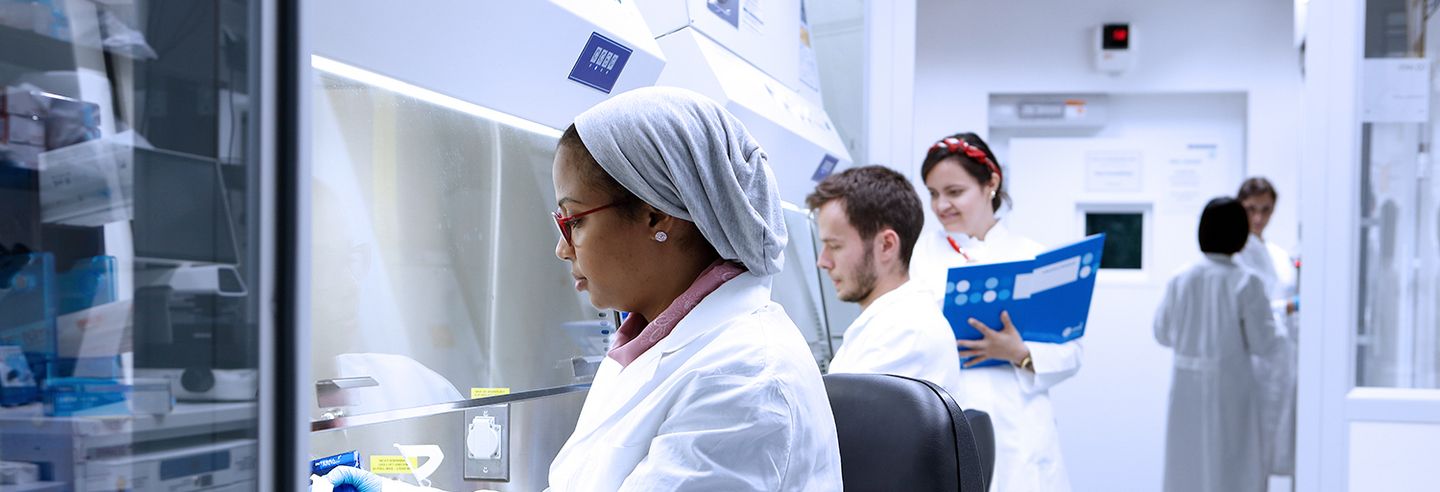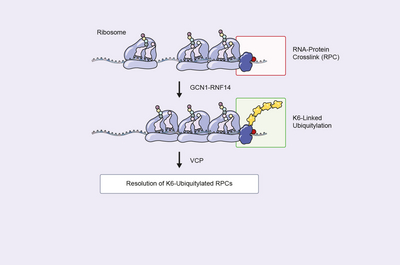Our cells are constantly exposed to many toxic chemicals that can damage our DNA, RNAs and proteins. Aldehydes (such as acetaldehyde and formaldehyde) are one such type of chemical compound. They can be found in the environment (e.g. in air, water or food) but are also produced internally by metabolic reactions within our cells. Most notably, they are produced as by-products when our cells detoxify ethanol after we have consumed alcoholic beverages.
Aldehydes are toxic to our cells because they can damage DNA, causing breaks that interfere with transcription and DNA replication. The build-up of acetaldehyde in our bodies is a major contributor to some of the hangover symptoms we get after drinking. Mutations that reduce the cell’s ability to remove aldehydes are also linked to genetic diseases such as Fanconi anaemia. However, it was not previously known whether the toxicity of aldehydes is solely a result of damage to the DNA, or if aldehydes also interfere with other cellular mechanisms.
In this study, which was published in the journal Molecular Cell, Petra Beli and her colleagues discovered that in addition to damaging DNA, aldehydes also create chemical bonds called crosslinks between RNA and proteins in the cell. These crosslinks stall ribosomes as they attempt to translate RNAs, inhibiting the production of new proteins. They also found that the cell removes these RNA-protein crosslinks via a new, evolutionarily conserved stress response pathway involving post-translational modification of the crosslinked protein with a special form of ubiquitylation and a protein called VCP.
Petra says, “The ubiquitylation-driven stress response elicited by RNA-protein crosslinks has been overlooked as a cellular quality control pathway.” Aldwin Suryo Rahmanto and Christian Blum, who are joint first authors of this study, add “Our results open a completely new line of research on RNA-protein crosslinks that are induced by reactive aldehydes”. These results demonstrate that aldehydes damage our cells in more than one way and describe for the first time a mechanism for removing RNA-protein crosslinks in our cells.
Importantly, our body’s ability to remove aldehydes gradually decreases with age, which could result in more RNA-protein crosslinks forming as we get older. The authors therefore speculate that this new stress response pathway may be particularly important for maintaining cell function in older individuals.
Further details
Further information can be found at https://doi.org/10.1016/j.molcel.2023.10.011
Petra Beli is an Adjunct Director at IMB and a Professor of Quantitative Proteomics at Johannes Gutenberg University Mainz. Further information about research in the Beli lab can be found at www.imb.de/beli.
About the Institute of Molecular Biology gGmbH
The Institute of Molecular Biology gGmbH (IMB) is a centre of excellence in the life sciences that was established in 2011 on the campus of Johannes Gutenberg University Mainz (JGU). Research at IMB focuses on the cutting-edge fields of epigenetics, genome stability, ageing and RNA biology. The institute is a prime example of successful collaboration between a private foundation and government: The Boehringer Ingelheim Foundation has committed 154 million euros to be disbursed from 2009 until 2027 to cover the operating costs of research at IMB. The State of Rhineland-Palatinate has provided approximately 50 million euros for the construction of a state-of-the-art building and is giving a further 52 million in core funding from 2020 until 2027. For more information about IMB, please visit: www.imb.de.
About the Centre for Healthy Ageing
The Centre for Healthy Ageing (CHA) is a virtual research centre launched in 2021 that brings together scientists in basic and clinical research from across Mainz that focus on ageing and age-related diseases. These findings should be used to promote healthy ageing and to find treatments that could prevent or cure age-related disease. For more information, please visit: www.cha-mainz.de.
About Johannes Gutenberg University Mainz
Johannes Gutenberg University Mainz (JGU) is a globally recognized research-driven university with around 31,000 students from over 120 nations. Its core research areas are in particle and hadron physics, the materials sciences, and translational medicine. JGU's success in Germany's Excellence Strategy program has confirmed its academic excellence: In 2018, the research network PRISMA+ (Precision Physics, Fundamental Interactions and Structure of Matter) was recognized as a Cluster of Excellence – building on its forerunner, PRISMA. Moreover, excellent placings in national and international rankings as well as numerous honors and awards demonstrate the research and teaching quality of Mainz-based researchers and academics. Further information at www.uni-mainz.de/eng
Boehringer Ingelheim Foundation
The Boehringer Ingelheim Foundation is an independent, non-profit organization that is committed to the promotion of the medical, biological, chemical, and pharmaceutical sciences. It was established in 1977 by Hubertus Liebrecht (1931–1991), a member of the shareholder family of the Boehringer Ingelheim company. Through its funding programmes Plus 3, Exploration Grants and Rise up!, the Foundation supports excellent scientists during critical stages of their careers. It also endows the international Heinrich Wieland Prize, as well as awards for up-and-coming scientists in Germany. In addition, the Foundation funds institutional projects in Germany, such as the Institute of Molecular Biology (IMB) and the European Molecular Biology Laboratory (EMBL) in Heidelberg.
Press contact for further information
Dr Ralf Dahm, Director of Scientific Management
Institute of Molecular Biology gGmbH (IMB), Ackermannweg 4, 55128 Mainz, Germany
Phone: +49 (0) 6131 39 21455, Email: press@imb.de

